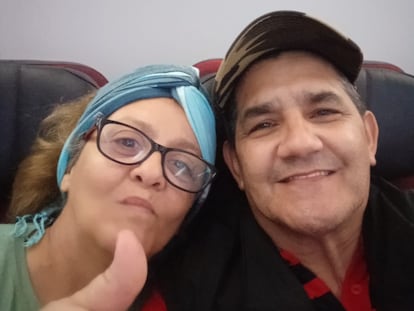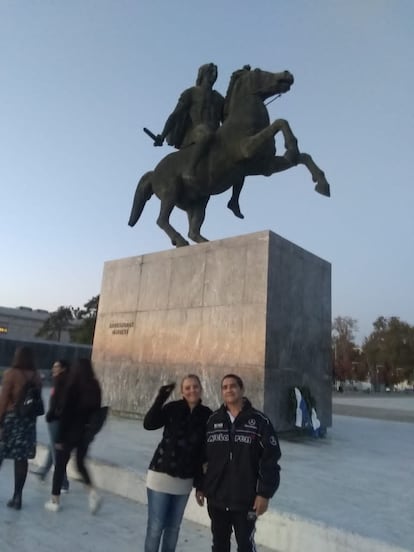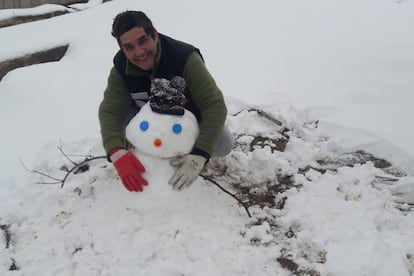Selfies from an unfinished trip: How a Cuban couple’s global odyssey ended in deportation from Mexico
Lino Antonio Rojas and Yudith Pérez returned to the island in November after a two-year journey that took them to Russia, Serbia, Greece, Turkey and Nicaragua as the goal of crossing the U.S. border became more distant every day

The day a country opens its doors to Lino and Yudith, their journey in search of a work permit and a decent life will finally end. “At our age, we will be happy where we have a roof over our heads and a salary where you don’t have to steal, or your salary won’t be stolen,” says Lino. They’re not asking for much more. Lino Antonio Rojas Morell, 53, and his wife, Yudith Pérez, 52, seem to have embarked on a never-ending journey. They have left despair and come back to despair. After two attempts to leave Cuba, they now remain in the country.
In 2021, Lino got rid of his carpentry shop in Old Havana and Yudith left her position as Secretary of Hygiene and Epidemiology at the Dr. Tomás Romay Teaching Polyclinic. They spent $1,250 on tickets and left on October 9 for Russia, one of the 25 countries that do not require visas from Cuban citizens. To this day, Lino still has a photo of himself, wearing an orange sweater, black hat and white face mask, in the Sheremetyevo Alexander S. Pushkin Airport in Moscow.
Two days later they continued to Serbia, where they spent 10 days. From that time, Lino has a photo where he appears with a serious face in front of the buildings of the main square of Novi Sad and another where he is sitting next to Yudith on a bench in the city. With the help of a coyote, they crossed the heart of Europe via the Balkan route. According to the statistics agency Eurostat, the year in which Lino and Yudith undertook their trip, 2.3 million migrants entered the European Union from a third country. In 2022, the European border agency Frontex recorded 330,000 irregular crossings, and 45% of those entries were after traveling the Balkan route, which has claimed the lives of 29,000 people since 2014, according to a 2022 record by the Project Missing Migrants from the International Organization for Migration (IOM).
In another of Lino’s many photos, he is seen on a bus with Yudith, looking calm, as the two travel to Bujanovac, in the south of Serbia. Once they were driven to the border with Macedonia, they were taken in a car to the border with Greece. For the entire trip through northern Macedonia, Lino was in the trunk of the car. His gallery of selfies also includes a photo of him giving a thumbs up, when everything seemed to be going well. There is also a video of Lino and Yudith walking several miles down endless and deserted train lines that both claim to be in Greece. They seem agitated and are wearing coats that have been protecting them from the European cold. They also look happy.
In Greece, Lino and Yudith lived in Thessaloniki, where a relative of theirs also lived. At times, they thought their trip had finally come to an end. They rented a place to live and Lino began studying Learn Greek Without a Teacher day and night. He learned how to say good morning by saying kalimera and to say good afternoon by saying kalispera. He also learned that the word for please was parakaló.
“I had to make a great effort,” says Lino. “But I learned quite a few words, and I was going to the market alone.” There is a photo of the couple in front of the statue of Alexander the Great on his horse Bucephalus on the seafront in Thessaloniki, and another photo of them visiting the city’s football stadium. But two months passed and it did not seem possible that they would ever get papers, much less work. “I got up every day at 2 or 3 a.m. and went out searching, and I did it because I wanted to,” says Lino.

Lino and Yudith decided to hand themselves over to Greek authorities to request asylum. The couple trusted Dimitrios Savvidis, the police chief of the Thessaloniki Immigration Unit, who wrote them a letter in his own handwriting explaining to those in charge of the Orestiada post that the Cubans were political asylum seekers. Savvidis assured them that within 15 to 20 days they would receive a positive response. That never happened.
They were taken to the Fylakio refugee camp in Evros, a border territory with Turkey, where after delivering Savvidis’ letter, they had their phones, passports and other belongings taken away from them. Then they were put in a cell. “Without a mattress, without water, there was nothing,” Lino remembers. Yudith, who had her period, was even denied a sanitary pad.
When they were finally taken out of the prison and reunited with a group of 30 other migrants, the men were asked to take off their shoes and throw them into a garbage bid. In the area near the Evros River, they were made to kneel with their hands on their heads and all their money was taken. “The leader of the group put the money in his pocket while laughing,” says Lino. They then gave him back his passport, the photo of his grandson and cards with the prayer of the Guardian Angel and Saint Expedite.
Yudith says that they weren’t sure where they had been taken. “We didn’t know what was on the side there.” They had been put on inflatable boats, made to cross the Evros River, and left in Turkey, as they later learned.
“It was extremely cold, we were badly dressed for the weather,” says Lino. In the border area of Turkey, coyotes found them and the couple paid them $250 to drive them to Istanbul. Lino remembers that it was -17ºC in Turkey, and everything was blanketed in snow. In fact, he has photos of his first days on the trip, where he is seen making a snowman.
“It seems that this is a business between Turkey and Greece, because those people know that you are coming, they are waiting for migrants to take them to Istanbul,” says Lino.
The couple filed a complaint with the U.N. Human Rights Committee against the Greek government as soon as they could. The document, to which EL PAÍS had access, states that the Cuban citizens who entered Greek territory on October 22, 2021, “were collectively expelled to Turkey on January 29, 2022, despite having never been to Turkey before.” It also details the mistreatment they were subjected by the Greek authorities. “The plaintiffs were subject to an illegal collective expulsion following the pattern of pushbacks systematically carried out by the Greek authorities on the land border with Turkey,” the document adds.

In 2021, Human Rights Watch (HRW) stated that there was “mounting evidence that the Greek government has in recent months secretly expelled thousands of migrants trying to reach its shores.” The organization claimed that Greek authorities were forcing people onto “small inflatable rescue rafts and sending them back to Turkish waters.” Between 2017 and 2022, 374 incidents related to theft were recorded in this area, according to an investigation carried out by EL PAÍS and the Greek newspaper Solomon. The violent treatment and expulsion of migrants from Greece was also documented. Likewise, a report published by the National Human Rights Commission states that in 88% of the cases the deportees suffered violence and in 93% their belongings or money were stolen. Last year, Al Jazeera reported that at least 30 Cubans waiting to apply for asylum in Europe “were forcibly expelled from Greece to Turkey” and subjected to “forced undressing, beatings, detention without food or water, confiscation of passports, money and other personal belongings.”
To this day, the Greek government continues to deny that it carries out these practices. In an interview with CNN this year, Greek Prime Minister Kyriakos Mitsotakis denied that his country expelled migrants in such a manner or treated them in such humiliating ways. It is a “completely unacceptable practice,” he insisted.
Despite not knowing any Turkish language, and despite the cold, Lino and Yudith could have stayed in Turkey forever. In the country, which was not in their travel plans, they managed to find work in a shoe factory. Lino’s 53rd birthday was celebrated by his co-workers. Lino has a photo, with Yudith, blowing out candles on a chocolate cake.
“We were doing well,” Lino remembers, as if a hundred years had passed. “But the president of Turkey started deporting people, he said he had to get five million migrants out before the end of the year. “Life was becoming impossible, we were going to have to be running from the police.”
The other photos that Lino keeps on his cell phone show him and Yudith in the seats of a Turkish Airlines flight. On October 4, 2023, they left Istanbul airport for Havana, before being detained and deported by Turkish authorities.

Three days later, Lino and Yudith were photographed, this time in the seats of a Magnichartes flight, after buying tickets for $1,800 to Nicaragua, another of the 25 countries that does not require a visa for Cubans and the most common route to leave the island. Their goal was to cross Central America and reach the U.S.-Mexico border. Since the Nicaraguan government of Daniel Ortega established “visa-free” status for Cuban citizens in November 2021 “in order to promote commercial exchange, tourism and humanitarian family relationships,” more than 300,000 have arrived in the United States.
Lino and Yudith, following a coyote, left Nicaragua for Honduras, then entered Guatemala, until they finally arrived in Mexico. Lino has photos and videos with dozens of migrants outside the Mexican Commission for Refugee Assistance (Comar), in Tapachula, where he requested a permit to stay in the country to begin the process to request asylum. Those in charge informed him that he would have a response in 10 days. But Lino and Yudith have still not received notification from Comar. When they tried to get to Mexico City to request an appointment with U.S. authorities through the CBPOne application, they were detained. “At the Tuxpan checkpoint, immigration officers stopped us,” says Lino. “They randomly picked up the first seven of us on the bus, took us off and took us to the Siglo XXI station.”
While the rest of the detained Cubans signed papers, Lino refused to sign the documents without first reading them. “They got furious and told me I had no right.” Around 1 a.m., they were taken to buses that took them to a prison in Villa Hermosa, the capital of Tabasco. After boarding the buses again and after 36 hours of travel, Lino and Yudith were at Mexico City International Airport. They were being forced to sign deportation orders.
The flight to Havana left on November 7 with 320 Cubans. Lino and Yudith’s passports do not have a stamp proving their return to Cuba, and they were not even given documents as deportees. “It’s a business to play with the lives of human beings,” says Lino. “Unfortunately we emigrate out of necessity, a need for freedom, not to be repressed, to give a decent life to our family.”
Lino keeps a photo of the day they were deported to Cuba. He is there, with a shrunken face, in the Havana bus terminal, waiting for a bus to the center of the country. With no place to live in the capital, they had to go to their daughter’s house in Ciego de Ávila, in the center of the island.
“It is hard to be deported, we have already had to start from scratch twice. We are not young anymore,” says Lino. “I’m not looking to get rich, just to live my remainig years with dignity.”
When Yudith, now back in Cuba, thinks of the journeys she has undertaken with Lino, she feels she might start crying. They have been doubly victims of the corruption and mistreatment suffered by migrants. In one of their latest photos, Lino and Yudith are seen with the Havana Capitol in the background. The couple say they are working. They do not specify what business they are in but say they are raising money to leave Cuba again. “Of course I’m going to try again,” says Yudith. “The first country that opens its doors to us, that’s where we’re going.”
Sign up for our weekly newsletter to get more English-language news coverage from EL PAÍS USA Edition
Tu suscripción se está usando en otro dispositivo
¿Quieres añadir otro usuario a tu suscripción?
Si continúas leyendo en este dispositivo, no se podrá leer en el otro.
FlechaTu suscripción se está usando en otro dispositivo y solo puedes acceder a EL PAÍS desde un dispositivo a la vez.
Si quieres compartir tu cuenta, cambia tu suscripción a la modalidad Premium, así podrás añadir otro usuario. Cada uno accederá con su propia cuenta de email, lo que os permitirá personalizar vuestra experiencia en EL PAÍS.
¿Tienes una suscripción de empresa? Accede aquí para contratar más cuentas.
En el caso de no saber quién está usando tu cuenta, te recomendamos cambiar tu contraseña aquí.
Si decides continuar compartiendo tu cuenta, este mensaje se mostrará en tu dispositivo y en el de la otra persona que está usando tu cuenta de forma indefinida, afectando a tu experiencia de lectura. Puedes consultar aquí los términos y condiciones de la suscripción digital.









































